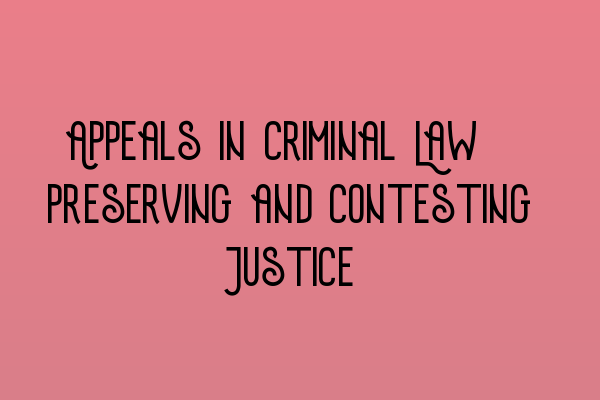Appeals in Criminal Law: Preserving and Contesting Justice
Our criminal justice system is built on the principle that every person should have the right to a fair trial and that justice should prevail. However, the reality is that sometimes wrongful convictions occur, and individuals may find themselves seeking justice through the appeals process. Understanding appeals in criminal law is crucial to preserving and contesting justice.
The Basics of Criminal Appeals
When a person is convicted of a crime, they have the right to challenge the decision by filing an appeal. An appeal is a request to a higher court to review and overturn a decision made by a lower court. It is important to note that an appeal is not an opportunity to re-try the case; rather, it focuses on errors of law or procedure that may have occurred during the trial.
Common grounds for appeal include:
- Insufficient evidence to support the conviction
- Misconduct by the prosecution or jury
- Errors in the application of law
- Ineffective assistance of counsel
- New evidence or witnesses that were not available during the trial
The Appeals Process
The appeals process begins by filing a notice of appeal with the appellate court. The appellant, the person seeking the appeal, must present a convincing argument supported by appropriate legal grounds and relevant evidence.
Once the notice of appeal is filed, the parties will submit written briefs outlining their arguments to the appellate court. The appellate court will then review the briefs and any supporting evidence to make a decision.
If the appellate court determines that errors were made during the trial or that there is new evidence that may change the outcome, it may order a new trial or overturn the conviction altogether.
Preserving Justice through Appeals
The appeals process plays a critical role in preserving justice within our criminal justice system. It provides individuals with the opportunity to correct errors that may have occurred during their trial and ensures that innocent individuals are not wrongly convicted.
For individuals seeking to appeal their convictions, it is essential to seek the guidance of an experienced criminal defence solicitor. A skilled solicitor can help navigate the complexities of the appeals process, gather relevant evidence, and present a compelling case to the appellate court.
At SQE Criminal Law & Practice Law UK, we have a team of experienced solicitors who specialize in criminal law and appeals. Our experts can provide the guidance and representation you need to effectively contest an unjust conviction or preserve a fair trial.
Whether you are preparing for your SQE 1 or SQE 2 exams, or seeking preparation courses, SQE Criminal Law & Practice Law UK has the resources to help you succeed. Check out our SQE 1 Practice Exam Questions and SQE 1 Practice Mocks FLK1 FLK2 to enhance your preparation.
Looking for SQE 2 Preparation Courses? We offer comprehensive SQE 2 Preparation Courses designed to equip you with the necessary knowledge and skills to excel in your exams.
Stay updated with SRA SQE Exam Dates and relevant information by visiting our website.
Do not let a wrongful conviction go unchallenged. Contact SQE Criminal Law & Practice Law UK today to explore your options for appealing a conviction and preserving justice.
